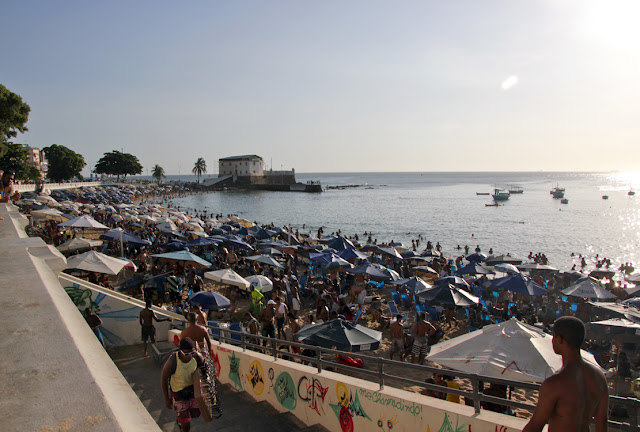Brazil is sensational.
Sensations of sun and water and beauty.
Sensations of people and culture and foods and music.
A water wonderland:3 days in paradise .... at the Marau Peninsula
A 6+ hour bus ride (that was advertised as only 4) traveling first around the Bay of Salvador from the port, continuing south along the Atlantic coast of Bahia to Camamu where our water wonderland adventures began:
As the comfortable travel coach manouvers and bumps into Camamu, equatorial twilight and darkness comes swiftly at about 5:30 pm.
Mystery mounts as we bundle into the large covered speedboat for the 30 minute high-speed ride across the water to Barre Grande.
 |
| Luggage and package transport cart and attendant. |
 |
| Barre Grande town at night. |
 |
| Ilhade Goio: A real beach, not a photoshopped stage set |
 |
| A long march across the long beach toward snorkeling at the reef. |
 |
| What? ... a Buddha Bar, for real? |
 |
| At Barre Grande, roadways of sand, no pavement. |
Water ways for people in schooners, speedboats, or sailing vessels as well as leaves, pods, and seeds.
Schooners under power chug peacefully along, allowing for sunning, relaxation, repast, and cool beverages....
A day trip on this schooner to another island to visit Casaiba where the schooners are hand -built by laborers as they have done for many decades.
 |
| Harmons three: Joyce, Louise, and brother John. |
 |
| This is a school bus/boat , collecting the children from remote beachside villages. |
 |
| Vibrating green church in Casaiba. |
 |
| From the dock in Casaiba, the boat yard is a short seaside walk along the primary 'thoroughfare'. |


By schooner we came to this restaurant at Sapinto where we were served fresh fruits, fresh lobsters, bean and rice, and multiple sweets.
 |
| From the trough... |
 |
.... to the table. These are truly FRESH lobsters.
|

 |
| One of many refreshing caiporienas |
 |
| A grove of trees that felt like church. |
 |
Bird of Paradise plants in abundance: singles, doubles, and
complex. |
Back in Salvador: sensations of light and sensations of life.
 |
| Love and Concertina Wire |
On a Sunday morning in the vacant business district of Salvador harbor, evidence of a Condomble event from the night before. Condomble blends West African Yoruba traditions with some Roman
Catholic beliefs and adds in rituals somewhat akin to VooDoo.
 |
| Vivid colors on the people and the buildings. |
Brazilians celebrate sunset at the beach with music and clapping just as the sun goes down.
 |
| Suddenly, a pop-up beachside political protest appeared, they shouted a while, and then they ran away. |
 |
| Old Town, Salvador |








































































